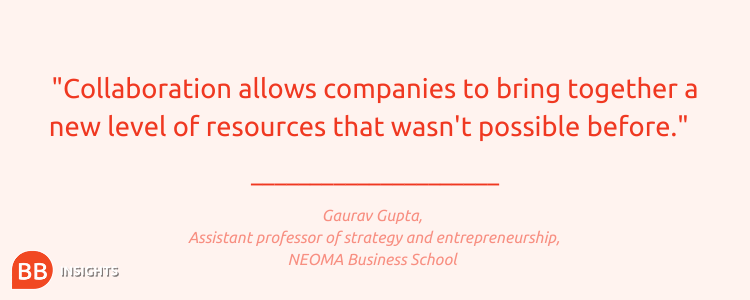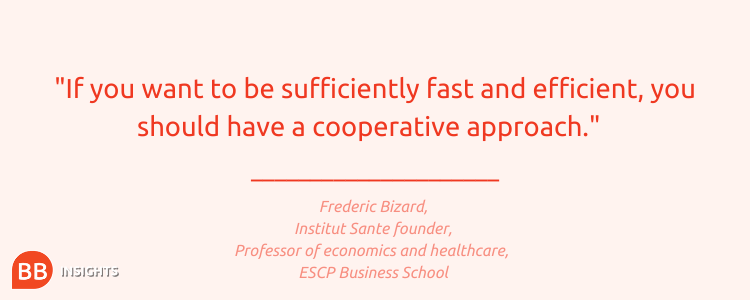The speed at which vaccines were developed is owed in large part to the information sharing and collaboration between scientists, pharmaceutical companies, and biotech firms.
It’s a process known as coopetition, “a situation in which some companies are competing in some markets but collaborating in others,” according to Stefan Wagner, associate professor of strategy and director of PHD studies at ESMT Berlin.
Coopetition and the COVID-19 pandemic
Rival companies have struck up pandemic partnerships, and pharmaceutical firms have developed vaccines without making a profit. Though coopetition is also common during normal times.
Competing tech firms often have coopetition agreements where they share software and hardware, and Samsung even supplies some of the components for the iPhone to Apple.

In most industries though, the overwhelming majority of companies compete with each other for market share and profits. But unique circumstances—like a global pandemic—can change this.
“Collaborations have been happening in the past but at a slower rate,” says Guarav Gupta (pictured right), assistant professor of strategy and entrepreneurship at NEOMA Business School. “COVID-19 has accelerated the pace at which companies collaborate and has removed some of the barriers to collaboration.”
One example of this is the partnership between pharmaceutical giants Sanofi and GlaxoSmithKline. The French and British healthcare companies are competitors with revenues above $40 billion, but they dropped any rivalry in April 2020 and announced a partnership to develop a vaccine.
The vaccine developed by the UK’s Oxford University and pharma company, AstraZeneca, happened in the same way. AstraZeneca approached Oxford University with a proposal for a low-cost vaccine which neither would profit from financially.
“[AstraZeneca] said we will take up what you develop, put it into development, and manufacture it, and we are not doing this to make money,” says Stefan from ESMT Berlin.
As a result, the Oxford/AstraZeneca vaccine is a fraction of the cost of other rivals, at around $4 per jab.
The pandemic has made some companies alter their priorities, choosing to prioritize public welfare over profits, with the world benefiting as a result.
Coopetition can spark innovation
For coopetition to be a strategy worth pursuing after the pandemic, there must be some benefit for the companies collaborating, who will be under pressure to generate revenue and profit.
One reason they may have for working together could be to spark innovation, says Gaurav. He believes the pandemic has shown companies that pooling their ideas and resources with outsiders can help spark creativity.

“Collaboration allows companies to bring together a new level of resources that wasn’t possible before,” he says. “There were a lot of issues created by the pandemic, but through collaborations between companies and technologies they have been able to solve them.”
One example of this is the vaccines themselves. Pfizer, the second biggest pharmaceutical company in the world, partnered with BioNTech, a biotech company, to create a vaccine based on BioNTech’s revolutionary mRNA technology, which has never been used in vaccines before.
By contrast, Merck & Co., the producer of the Ebola vaccine and another top five global pharmaceutical company, chose instead to rely on its own methods, which have been tried and tested for years.
While the Pfizer/BioNTech vaccine was the first to be approved in the UK and US, and is up to 94% effective, Merck & Co. had to abandon their trials after poor early results.
“The fact we are even seeing vaccines within a year was unthinkable before,” says Gaurav, but through competing companies working together and sparking innovation, this scientific breakthrough has been achieved.
Coopetition can drive efficiency
The pandemic has also shown that competing companies who collaborate can benefit from increased efficiency. It can also set them up to solve unforeseen challenges.

Frederic Bizard (pictured right), professor of economics and healthcare at ESCP Business School, and founder of the healthcare reform body Institut Sante, believes the pandemic has shown collaboration can help overcome supply chain issues.
Regulations on competition among supermarkets have been relaxed throughout the crisis, allowing different supply chains to coordinate by sharing distribution infrastructure and data. This has seen positive results, with supermarkets able to increase food production by as much as 50% to tackle pandemic panic buying.
A stark contrast has been the rollout of vaccines, which sparked political tension after the UK chose not to take part in the EU Vaccine Procurement Scheme, opting to be independent in its vaccine strategy.
The result has been that the UK has raced away from many EU countries in vaccinating more of its population per 100 people than countries on the continent.
“The absence of collaboration between the UK, EU, and the US on distributing the vaccines has been an enormous mistake,” thinks Frederic. “If you want to be sufficiently fast and efficient, you should have a cooperative approach.”
Coopetition after COVID-19
Some of the big successes during the pandemic have been achieved through coopetition, though questions remain over whether a collaborative approach would work in a post-pandemic world.

ESMT's Stefan (pictured below, right) believes that the opposite is true. He thinks that whereas vaccine development showed the value of coopetition, the actual vaccine rollout, alongside other issues like Brexit, have shown that the trend is moving towards independence and isolation.
“We seem to have a narrative that we need to be more independent from international supply chains, and we need to be self-sustained,” he says.
“Once leaders of countries start saying they want to do less business with other nations, that affects supply chains and trickles down into all industries.”
Another issue is that many of the partnerships formed during vaccine development were struck because of the urgency of facing a global pandemic. Science itself is also traditionally highly collaborative.
“In a normal life, when you don’t have to be as fast as you do at the moment, I am not sure that the collaboration brings the same value,” says ESCP’s Frederic.

Markets have been built on competition for generations, and while the pandemic has seen that change, it would be all too easy to revert to traditional business models.
Gaurav of NEOMA is more positive though. He believes that the pandemic has at least shown companies that coopetition is possible.
“Earlier, two organizations may not have been comfortable working with each other, but now they have been introduced there is more possibility that they will commit to long-term collaboration in the future,” he says.
While the pandemic has shown the value of coopetition in the form of heightened innovation and efficiency, it remains to be seen whether when the world is vaccinated companies will adopt a strategy of coopetition to drive growth. Science and business collaborating to solve a global health crisis is one thing, but there’s no guarantee that when the urgency is removed, collaboration will be front and center of CEOs’ minds.
Read next:
How Do You Distribute A COVID-19 Vaccine To 7.8 Billion People?
BB Insights explores the latest research and trends from the business school classroom, drawing on the expertise of world-leading professors to inspire and inform current and future leaders
RECAPTHA :
5e
94
db
17








